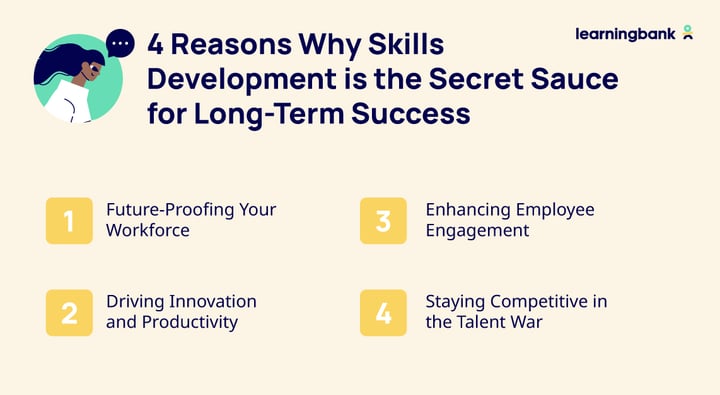Today, organizational needs and trends change at the speed of a TikTok video. Automation, global recessions, and the disappearing and evolving nature of job roles all point to one thing: skills development is no longer a perk; it's a necessity for success.
With up to 85 million jobs at risk of displacement in the next five years and an estimated 97 million new roles emerging, the pressure to adapt and acquire the skills of the future is immense.
In this blog post, we'll go through the significance of skills development in organizations, why it's important, and how it paves the way for long-term success. And, of course, we'll give you some hints on how you can go about it.
The Role that Skills Development Plays Today
Ok, let's go through the basics first. Skills development is the process of acquiring and enhancing the abilities, knowledge, and expertise necessary to excel in a particular field or profession. This can include the development and training of both hard and soft skills, from technical skills to interpersonal skills.
And let us look at some more numbers:
- 87% of companies say they have skills gaps or expect to have within a few years
- By 2025, 1 in 2 workers will need reskilling
- For the ones staying in their roles, 40% will still need upskilling
- 78% of business leaders say building capability is critical to their organization’s long-term growth
- And over 70% of employees will be trained by 2025 to prepare for the jobs of tomorrow
These statistics paint a clear picture of the challenges and opportunities that lie ahead. The demand for skilled workers is skyrocketing, and the supply of qualified candidates is dwindling.
So, what’s the purpose of skills development? Well, it is to continuously improve and expand the capabilities of the employees and the entire organization. The skills gap presents a significant risk to organizations' growth and innovation, but it also presents a golden opportunity for those who embrace skill development.
The Importance of Skills Development
By investing in skills development, both individual employees and the organization can stay competitive, adapt to changing environments, and achieve long-term success. You can say skill development is the bridge that closes the gap between the current skill levels and the desired skill levels. In other words, it's a way to close the skills gaps.
Are you and your company on the skill development ride? If you aren't there yet, here are some reasons to get on it.👇
4 Reasons Why Skills Development is the Secret Sauce for Long-Term Success
- Future-Proofing Your Workforce. In the age of automation and artificial intelligence, the skills demanded by the job market are shifting faster than ever. As an L&D professional, your role is to future-proof your workforce. Investing in skills development, you ensure that your employees are equipped with the capabilities needed to navigate the challenges of tomorrow's job landscape. This will include developing your employees' hard skills and also giving them soft skills training, such as conflict resolution, teamwork, or leadership.
- Driving Innovation and Productivity. A skilled workforce is essential for driving innovation. Employees with the right skills can better identify new opportunities, solve problems creatively and quickly, and develop innovative solutions that can propel the organization forward.
- Enhancing Employee Engagement. Skills development is not just about ticking boxes; it's about engaging your employees in a continuous learning journey. When employees feel that their organization is invested in their growth, it boosts morale and job satisfaction. This, in turn, leads to higher retention rates and a workforce that is not just skilled but deeply engaged.
- Staying Competitive in the Talent War. Talented individuals are always on the lookout for employers who invest in their professional growth. By emphasizing professional and personal development and building your employees' skill sets, your organization becomes an attractive destination for top talent. This is especially crucial in a competitive job market where the war for skilled professionals is fiercer than ever.

And did you know that 2/3 of employers expect to get a return on investment from employee skill development within just one year!? So, yes, you will for sure get bang for the buck!
Strategies for Skills Development
So, what can you do to ensure you're on top of this ever-changing skill landscape? Part of the answer lies in embracing a culture of continuous learning, one that encourages employees to continuously acquire new skills. And here are some starting points:
- Conduct a skills assessment: The fist part of is to identify the skills that are required for success in a particular field or profession. That can be done through skills assessments and gap analyses. Read more about how to do it in Skills Gap - What is it, and How do You Address it.
Once you have identified the skills gaps, you can start to develop a plan to address them. - Offer employees visibility on potential career paths: With the skills profiles developed in step one, you can build an opportunity marketplace to help promote internal opportunities for different roles based on company priorities.
- Align your learning strategy with your business goals: Once you've gained insight into your teams' and organizations' goals and the skills required to propel them forward, you can build a focus on the right learning experiences. Adjust and create tailored training programs to bridge the identified skills gaps.
- Transition to a skills-centric approach in performance management: Work towards a continuous dialogue around skills between managers, coaches, and their respective teams. Elevate the significance of skills development by making it a central focus during performance reviews, where the spotlight shines on nurturing and advancing the skills that bring both individual and team success.
In Conclusion
Developing your employees' skills, allows you to unlock the true potential of your organization, future-proof your workforce, drive innovation, enhance employee engagement, and stay ahead of the competition in an ever-changing landscape.
Remember, investing in skills development is not just about ticking boxes; it's about empowering your employees to reach their full potential and propelling your organization toward success.
Want even more insights? Watch the video below from World Economic Forum.
